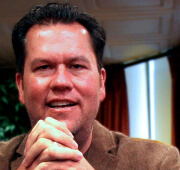
This Sunday, hundreds of thousands of people will tune in to the Emmy Awards. Viewers will wait eagerly to see their favorite actors and actresses dressed in their fancy best.
At some point during the show, a B-list actor will introduce a two-minute video reel of awards presented at an earlier ceremony for the Creative Arts Emmy Awards.
It strikes me as odd. Two minutes for the creative arts? Surely the folks who have invented new technologies to improve everything from sound quality to special effects deserve more than a measly two minutes.
Creativity is one of the world’s greatest assets. But the Emmys aren’t the only ones glossing over this area of innovation. Many times I’ve wondered how much Christians care about the creative arts.
I recently participated in a weeklong Christian conference on creativity in India. A case could be made that any number of topics would have been more important. Why not prayer or Sunday school? Why not evangelism or discipleship?
These have historically been the topics and activities the church has invested in. More recently it has been the issue of leadership that has captivated our attention. And in a nation like India, with its fast-exploding population, pervasive poverty and religious conflicts, is creativity really worth a week’s time and attention?
I am convinced that in the midst of all these very important subject matters, the church has missed out on perhaps the most powerful element in the cosmos: creativity. The subject of creativity has been overlooked and marginalized to the church’s peril. The world has stolen our God-given mandate to use our creativity to influence and transform culture.
It is understandable why the church is uncomfortable in the arena of the creative arts. Scripture tells us that it was the most creative and artistic of the angels, Lucifer, who began the rebellion in heaven against God’s authority and supremacy. Lucifer tried, and is still trying, to usurp and pervert one of the most powerful aspects of God’s nature—His ability to create.
But Lucifer’s attempts are just cheap imitations of the true Creator.
God is creative. In the beginning God spoke. The word here in the Hebrew is Davar, an action word that is intrinsically tied to the concept of creativity. God said, “Let there be light,” and there was light. Out of nothingness God created the heavens and the earth. His creative Word established everything. His artistry is in everything we see, hear and feel.
Even we ourselves are a product of His handiwork. And awesome wonder of wonders, He choose to create us in His image. This was the most dangerous of decisions. Even after seeing how Lucifer misused his creative, artistic nature, God still decided to form us into creative beings with the ability to think, develop and innovate.
When we express our own creativity, we reflect the reality that we are made in the image and likeness of God. And that’s why Satan hates it. At every turn, Satan tries to distort or destroy the creative power of God’s people.
We’ve all seen how the gift of creativity can be used for destruction. Writers and photographers have used their God-given abilities to create pornographic content. Actors have misused their talents to depict perversion and debauchery. The very talents that God designed to be used to honor His name have been used to blaspheme His name.
But misuses of creativity haven’t only happened outside of the church. We have tragically watched those who once proclaimed Christ fall to the temptations of self-aggrandizement and self-indulgence.
The reality is that if our hearts and minds are not governed by God’s Word, then the enemy twists our creativity, perverts our art and uses it for evil rather than good.
While the perversion of God-given creative power permeates our culture, I propose to you that Satan’s greatest tactic hasn’t been to shout us down but rather to silence us. His most effective weapon has been the subversion of the church’s and of godly people’s ability to use the creative force that God intended for us to use to lift up and redeem all that He made and intended for us.
That’s the scary news. But here is the tremendously good news. When we tap into God’s creative Davar power within us to speak, proclaim, sing, act and produce, the power of His Word will transform those trapped in the darkness and despair. In these end times, the church must recapture our rightful creative power and relate the gospel story in a fresher, more relevant and dynamic way than ever before.
The church must not run away from the battle for our culture; we must run toward it. We must take our God-given ability to think, innovate, produce, sing, act and write within the confines of God’s Word, and catalyze a movement of creative expression that will capture the hearts and minds of this generation with the truth and beauty of who Jesus is.
Endowing mankind with creativity is God’s riskiest venture. After all, it was not his most powerful angel—Archangel Michael—who caused the fall; it was Lucifer, his most creative one. Satan, the kingdom’s adversary, finds his greatest strength in subverting godly creation and encouraging a perverse creativity.
The church fears creativity because it has been so awesomely perverted by the enemy. But the end-times church has a mandate to recapture God’s creative power of Davar. As we do, God will transform the world.
The church global is crying out for a creative minority that spirituality resonates, not through mimicry of the materialistic majority, but stands opposed to it by the power of true spiritual enlightenment. There have been historical reformation moments when a creative minority class arises from the church. Unfortunately, of late we resemble creative cripples limping behind the secular herd.
Whether or not you tune in to watch the Emmy Awards this Sunday, I hope you’ll be inspirited to tap into your own creative power and use it to the glory of God.
Rob Hoskins is President of OneHope (www.OneHope.net) Based in South Florida, OneHope is reaching the world’s children and youth with the message of the Bible in a way that addresses specific cultural challenges. Founded in 1987, OneHope has reached some 650 million young people in 125 countries with the message of the Bible through its Book of Hope publications and The GodMan animated film.






Leave a Comment
You must be logged in to post a comment.